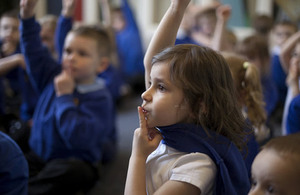New curriculum will make education system 'envy of the world'
As a new school term begins, millions of children will be taught a new ‘world-class’ curriculum to prepare them for life in modern Britain.

Millions of pupils returning to the classroom this term are being taught a forward-thinking, knowledge-rich national curriculum that will give them the knowledge and skills to succeed in modern Britain, School Reform Minister Nick Gibb said today.
The programmes of study are a key part of the government’s plan for education and long-term economic objective.
They embody high expectations and are designed to raise standards for children aged 5 to 16, especially the poorest. It will provide a broad and balanced education ensuring all pupils gain core knowledge across a range of key subjects so that they get the best start in life.
The curriculum combines the best elements of the world’s most successful school systems, including Hong Kong, Massachusetts, Singapore and Finland, with some of the most impressive practice from schools in England.
With a strong focus on getting the basic skills right in primary school, it has been deliberately designed to ensure England has the most productive, most creative and best educated young people of any nation. It ensures a population with the knowledge and skills not just to secure good-quality employment and success in life, but also to help us compete and win in the global race.
The new curriculum is also far less prescriptive and is about half the size of its predecessor, allowing teachers to concentrate on what they do best - teach - rather than being burdened by endlessly reading the document.
Visiting Grove Park Primary School in Chiswick School Reform Minister Nick Gibb saw the new national curriculum in action. He said:
Our plan for education is to ensure that young people leave school with the knowledge, skills and ambition to succeed in modern Britain and to compete in the global labour market. Central to that plan is our new curriculum which will not only give young people a solid grounding in the basics but also challenge them and ensure they fulfil every ounce of their potential.
We are determined to eradicate illiteracy and innumeracy. That is why our new English and maths programmes of study will help children master the fundamental concepts of both subjects - the best way to improve achievement for all pupils.
We want our teachers, the best in the world, to have the freedom to do what they know is best and shape that curriculum to provide the maximum benefit for their pupils.
Examples of improved content in the new curriculum
Maths
- The new curriculum introduces 5-year-olds to fractions for the first time. This will mean they have a solid grounding at an early age, so by the time they start secondary school they are ready for algebra and more complex arithmetic.
- The current requirement is for multiplication tables of 10x10 to be taught by age 11. The new curriculum states that 9-year-olds must be taught times tables to 12.
- There will be much more emphasis on the skills of mathematical modelling and problem-solving.
- The current secondary curriculum is very unclear about what is expected of young people. The new curriculum is much more precise and challenging. It will help prepare young people for post-16 maths by giving them good foundations for advanced topics including calculus.
English
- Children will leave primary school able to read fluently and widely including a range of fiction, poetry, plays, non-fiction and reference books.
- Primary school children will also learn to use semi-colons, colons, dashes and brackets correctly; spell words with ‘silent’ letters, eg knight, psalm, solemn; and recite a range of poetry by heart.
- There will be no prescriptive list of writers beyond Shakespeare, who will have a key place at the heart of the English curriculum. All pupils aged 11 to 14 will study at least 2 of his plays in depth. Seminal world literature must also be taught to that age group.
Computing
- Rather than learning how to use word processing and presentation packages, 5-year-olds will be taught how to write, create and test computer programs, using systems such as those developed by MIT and others.
- Vague references in the current curriculum to how technology has changed our lives are removed.
- There is a much greater focus on practical experience of programming and understanding the fundamental principles of computer science.
- From ages 11 to 14, pupils will be taught how to code and use a range of programming languages to help solve computer problems.
Science
- The new curriculum has a greater focus on scientific knowledge, increases practical work and emphasises mathematical requirements for science.
- Vague, abstract statements in the current curriculum on understanding the nature and methods of science are removed.
- Evolution will be taught to primary school pupils for first time.
- Non-science topics like caring for animals and societal context are removed.
- In secondary school pupils will study the 3 disciplines of biology, chemistry and physics in much greater depth.
- There is much greater emphasis on mathematical modelling and problem-solving, eg more sophisticated mechanics.
Design and technology
- The new curriculum is more ambitious than the current one - it will set children on the path to become the next generation of British designers and engineers.
- Pupils will be taught the skills and expertise to design and make products, and will analyse the work of leading designers from the past and now.
- There will be much greater use of design equipment to keep pupils up to speed with the fast-changing high-technology industry, eg 3D printers, laser cutters and robotics.
- There is an increased level of sophistication in the new curriculum in the use of electronics, eg pupils will be taught to incorporate and program microprocessor chips into products they have designed and made.
DfE media enquiries
Central newsdesk - for journalists 020 7783 8300